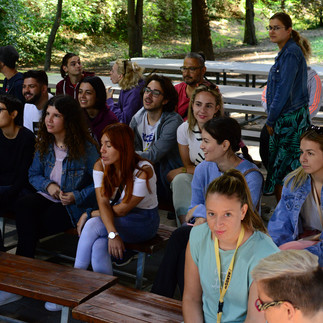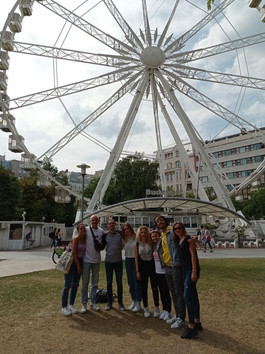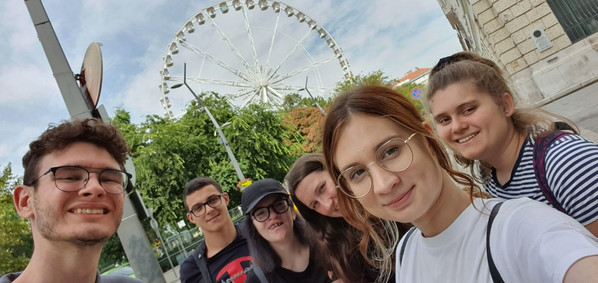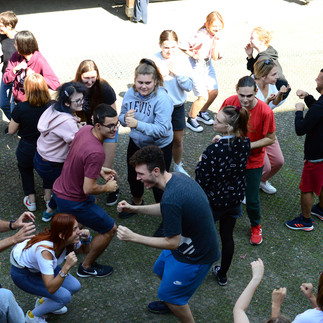Youth Mobility - a wonderful week in the International Sign Language Camp
- Katya Tempfli
- Sep 13, 2021
- 6 min read
Updated: Dec 7, 2021
When I dreamed of this project, I imagined something very similar. An intensive, inclusive and integrated camp where a Deaf, hard of hearing or hearing young person has an experience regardless of their hearing or nationality. And in addition to the experience, with this fantastic team, we were able to go into legal issues related to human and disability, dilemmas about principle or real equality, personal experiences about the nature of discrimination, which in turn far exceeded my expectations.

We have set ourselves the goal of getting the young people in the camp to get to know and live in a world where the way of communication is different but completely natural. Everyone can play together in a nonformal, improvisational-based, inclusive group activity, regardless of their hearing status, at the Sign Language Playground International Youth Camp.
History
The project started in 2019. We started thinking together about what non-formal education can mean in the field of Deaf education. Combining the previous experience and knowledge of the partners, we started the work and created a series of activities, which we further developed and expanded with long-format non-formal educational activities at the second meeting in Warsaw in early 2020. Due to the epidemic, we also had to postpone the camp planning meeting and the youth camp itself by a full year. The world recovered in the spring of 2021, and following a camp organizing meeting in Greece, the international youth Sign Language Camp on the shores of Lake Velence finally began in the first week of September.

Participants
We worked with forty young participants, mixed with 18-25 year olds, Deaf, hard of hearing and hearing. Half of the young people were hearing impaired. The two Greek partner organizations delegated 20 young participants, and the Poles and the Hungarians, 10-10. The Polish participant group came from a deaf school in Warsaw. Hands Up Agency, is a Sign Language interpreting service based in Athens, who have brought in young people in their sight using their services. You In Europe recruited from Deaf young people in Thessaloniki. Hungarian participants were members of the Youth Club for the Deaf and Hard of Hearing in Budapest, students from the Special School for Deaf in Vác and students of Sign Language interpreting.
Professional program
The first day was about getting to know each other and diverting language chaos. Sixty people who are communicating in eight – eight! – different languages. English, Hungarian, Greek and Polish spoken languages, international, Hungarian, Greek and Polish Sign Languages. In parallel, at once, bouncing from one minute to the next. Before our first project meeting, this situation was really distressing. How many interpreters do we need? Where will they stand? Who will the deaf participants watch? How are we going to work in small groups or pairs? Should we put their own interpreter next to everyone? I imagined a complete chaos in my head and it took a lot of headaches to organize the project work in preparation for any eventuality. And then came the reality: in essence, the way of communication was established, each participant communicated in a super self-advocating way what kind of language accessibility he needed, and the Hungarian, Greek, Polish sign language interpreters, standing side by side, signed in their own sign language, and in every situation resulting from different language use, we found a solution in seconds, thanks to the expertise and flexibility of the professionals involved. At the other partner meetings, this well-known line-up has already taken place, and we continued in the camp in the tried and tested way, with so much development that this time two sign language interpreters per organization worked simultaneously throughout the professional and leisure programs. Thanks again for their wonderful work!
So on the first day, we steered communication accessibility. In the evening, in the informal part of group formation, we have already introduced our improvisation-based activities, in which important group-forming processes are hidden behind play and entertainment.
From the morning of the second day, the planned professional programs started, where we put into practice the activities formed at the partner meetings in this multilingual, large integrated group. These activities are enhancements to the Sign Language Playground games dreamed up by teh JEL Foundation, adapted for young adult participants (just a few names: Virus Ball, VUSS, Clap Dance, Bing-bong, The Code, Traffic Signs, Touch&Sign, Dolphin, Zombie…)
In the after-lunch block, Youth In Europe led an orienteering and team-building game, where participants had to solve different mental and physical tasks in mixed teams, and due to differences in language and hearing status, the tasks had to be much more adaptable and creative in solving. Ultimately, the goal of the project is to help young people learn and incorporate into their daily lives skills that are thought-provoking, can be passed on and, later in life, help them in sharp situations. When it is not necessary to collect sticky notes together for deaf and hearing people in a youth camp, but for example to work together in a workplace, solve problems, participate in something together.
Unfortunately, the third day was overshadowed by an unexpected, terrible event: at dawn, a sneaking thief visited one of the rooms and took a bag and a laptop. The bag and the missing documents were later retrieved, which was a huge fortune, as it was for a foreign participant whose travel homex0 would have been much more difficult without the documents, but it was still awful for everyone to experience this situation. We had little time with the campers at the time, but as a team, we were able to help process each other. The common exercises we continued to work with helped us in this, both as a distraction and a step forward.
On Tuesday, we organized a full-day trip to Budapest, where we combined the classic sightseeing tour with an interactive and creative free session: we used the ActionBound application. We took the participants to emblematic or cultural, historically important points of Budapest. At these points (Nagyvásárcsarnok, Váci street, Ferenciek Square Church, Vörösmarty Square, Budapest Eye, Erzsébet Square, St. Stephen's Basilica, Parliament, József Attila statue, Shoes on the Quay, Freedom Bridge, Danube ship, Gellért Hill, Citadel, Garden of the Philosophers…) the participants had to go through, perform a task (make a selfie, sign a poem, count, find, scan a QR code….) and upload it to the application.
We continued the non-formal learning exercises on Wednesday and Thursday, implementing the three complex, long-format activities. Participants played in mixed teams. In Stock Market activity, teams try to score through solving subtasks. The hidden aim is to get to know each other's culture as well as the languages (both spoken and Sign Language). The participants worked in international groups, their goal was to collect as much play money as possible, for which they had to complete tasks in which we hid important elements from the customs and culture of all participating countries and deaf communities. Competition and cooperation took place in parallel in practice. The participants not only had fun, but also learned about other countries, languages and cultural differences.
Limit 20 is a complex, long activity with multiple hidden goals. Participants play on the surface in smaller, mixed teams for 10 rounds, where a jury scores their performance. Discrimination and inequality are present to players in a hidden way. How do participants starts behaving, individually and as a team? Are they changing their strategy? The essence of the activity is how participants react to hidden discrimination in both consciously manipulated gameplay - both positive and negative. At the end of the gameplay, there must be time to reveal the secret and release the tension. Participants’ negative experiences should be resolved and the impact of their experiences should be discussed; who brings what out of practice and how their views on discrimination have changed. This morning, as a member of the jury, we hosted Dr. Ádám Kósa and Dr. Gergely Tapolczai on behalf of the Hungarian deaf community.
The practice called Hurricane is based on the idea of the JEL Foundation. First we formally discussed main concepts in mixed teams (bilingual education, discrimination, ratification of Sign Language, independent living, integrated education, reasonable accommodation, free choice of interpreter, CODA / child of Deaf parents). We further deepened them through nonformal play and creativity, with a toolbar with a changing and declining number of items. How would you play with objects “ratification of sign language”? Draw the "bilingual education" in 1 minute! Express the concept of "free choice of interpreter" with a single expression. Wonderfully creative solutions were born, lots of ideas and thoughts, huge laughs. But I am sure the participants will remember these eight concepts, their content and their importance. A detailed and signed description of the exercise can be found on both the project website and the Project Results website, along with all short and long format activities, in English. They are available here in Hungarian. Polish and Greek.
Being a fair Youth Mobility Program, the participants held music-dancing-eating-drinking shows in the evenings about the country they came from, the life there, the Deaf community, the Deaf culture.
At the last day’s evaluation, we received very good feedback and opinions from the participants and it was best to see when there was a crazy insta-account and other contact exchange between the youngsters even before the last minutes before departure. This camp was a big challenge for us, especially after a year and a half of forced rest, we put in an awful lot of work, but it was the result, we ran a unique international youth project in Hungary, where we believe that deaf and hearing participants everything was taken home from the week they spent together. A specific non-formal methodology for the education and development of the deaf has taken its final form. To be continued - next year…?

.png)
.png)



























Comments